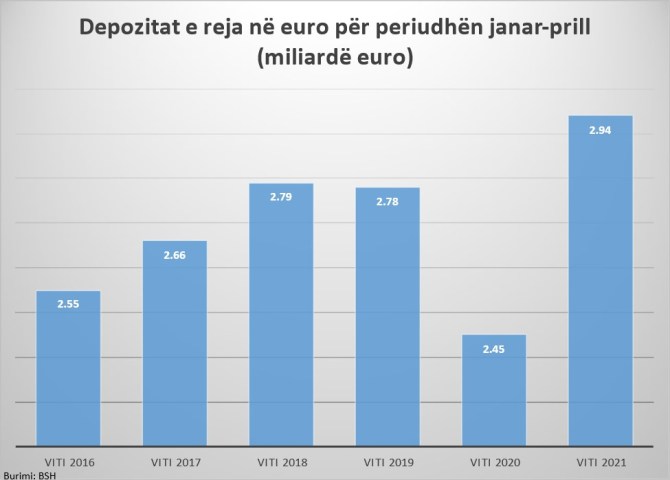New euro deposits in the banking sector are at their highest level in at least the last six years.
According to the Bank of Albania, for the period January-April of this year, the value of new deposits in European currency reached 2.94 billion euros, an increase of almost 20% compared to the same period last year.
According to the central bank’s statistical reporting method, this amount also includes renewed deposits and does not all consist of new inflows. However, the trend compared to previous years clearly shows an increase in the inflow of new deposits in euros within the banking sector for this year. According to the Bank of Albania, total foreign currency deposits at the end of April amounted to the equivalent of ALL 605 billion, with an annual increase of 8%.
At the end of April, foreign currency deposits accounted for 53.6% of total bank deposits and among them the euro continues to remain the preferred currency of Albanians to keep their savings. Unlike the credit situation, where the lek is gaining ground at a rapid pace, the euro remains dominant in deposits and is apparently perceived as a more reliable currency by the general public. This may be related to the considerable euroization of the Albanian economy and the fact that high value assets, mainly real estate, are quoted in euros.
For the most part, euros in the banking sector are credited to current accounts. As interest rates are very low, most banking sector customers do not view their investment in time deposits with interest. According to the Bank of Albania, the interest rate on the most widely used time deposit, the 12-month one, for April was only 0.13%. Another indirect indicator of the growing supply of the euro seems to be the exchange rate performance. In the first half of this year, the euro showed a downward trend in the lek exchange rate, which foreign exchange agents explain mainly by the high supply of the euro in the market. The source of foreign exchange inflows can not always be fully explained by formal flows.
For the first quarter of this year, the current account deficit deepened to 309 million euros, an increase of about 30% compared to the same period a year earlier. The expansion of the current deficit by about euro 70 million, however, was offset by a stable performance of foreign direct investment and especially by the increase in capital account inflows. These flows mainly consist of capital transfers in foreign currency where the beneficiary is the Albanian government. / E.Shehu







